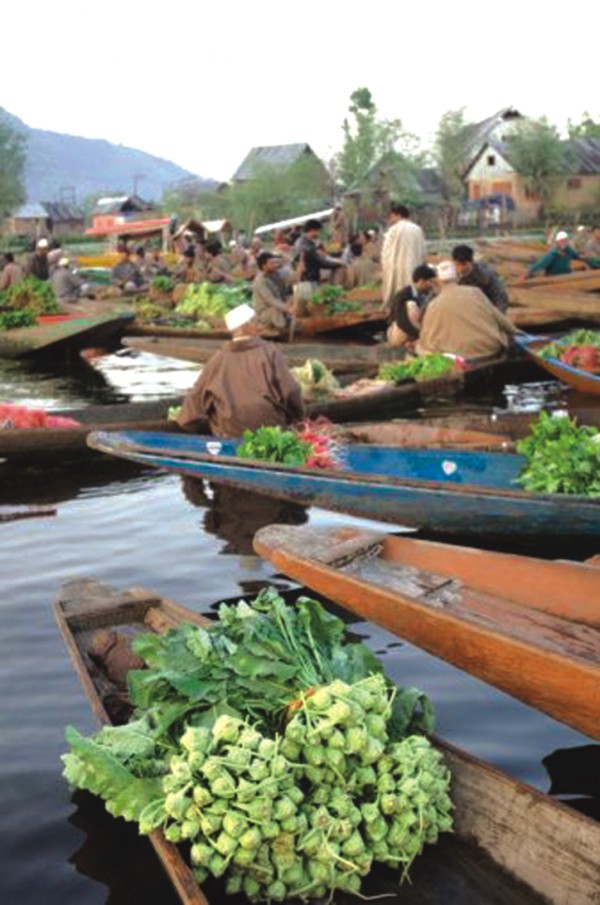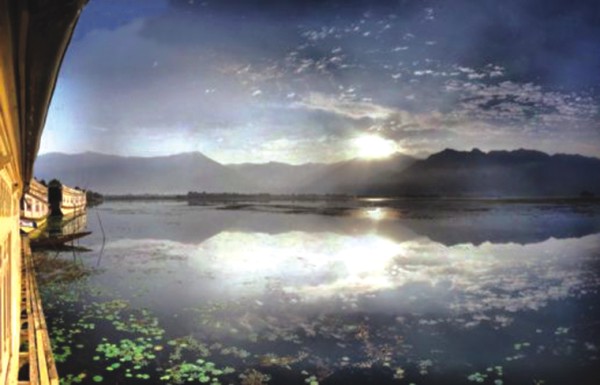
Inside
|
A Walk through Downtown Srinagar
SHIVAM VIJ narrates the story of a day in the life of a Kashmiri.

Photo: PHOTOSINDIA/GETTY IMAGES
The voices that reverberate in your head after a visit to Kashmir leave you numb, making you sadder the more you think about them. You know that it is going to be worse when you visit next year. The mountains that you see faintly from over the bridges on the Jhelum river in downtown Srinagar, a thousand year old settlement, you know they're coming closer.
An old man you see on the road wants your attention. No, not here. Let's get inside a parked car. You wonder what secrets are to be passed on. From inside his pheran he takes out a bundle of papers. Both his sons were picked up from Kathmandu in Nepal in 2000, where they were eking out a living. Had they been militants why would they have… look, look, this paper, certificate of registration of Indian nationals in Nepal? The last he heard of his sons some years ago was that Indian intelligence had detained them in Delhi. He's coming to Delhi next month. Could you help? All he wants to know is what happened to his sons, which prison are they in, could he see them once?
There's only so much time you have to tell him to have hope, because you have to meet an unemployed young man -- who was fortunate not to be picked up but still lives with the flashes of memory about the fear he and his family survived during the Indian Border Security Force's "crackdowns" of the early '90s. He is nearing 30. All he wants is a job. But he's not a stone-thrower. The government doesn't want to buy him over. The window of his modest house overlooks the market square. From this window he has seen militants and militaries contest each other for all his adult life. In the curfew last summer, even opening the window could have been fatal, as a young girl found out. Huddled inside, he wondered all summer why they were doing this! You could stop someone from stone-throwing by shooting in the leg. Pray, why were they shooting above the waist?
He put two and two together and asked himself who benefits from such one-sided bloodshed. The only answer he could come up with was the notorious Pakistani Inter-Services Intelligence. Could the ISI have bribed your Indian soldiers, he asks. But then he discussed this with his father, whose opinion he values. His father suggested it must be the tourist lobby in nearby Himachal Pradesh, another Indian hill state that Israeli backpackers have made their home. Those wily Manali resort owners you know! What do you think, he asks, why did your soldiers kill 117 of us last year for merely throwing stones?
In his early childhood he saw the "paradise Kashmir", whereas today's teenagers grew up in the "Kashmiri hell" of guns and bunkers, playing with bullet shells rather than marbles. About today's teenagers, he will tell you, they don't have fear.
You will see how true that is when you meet the teenagers who identify themselves as 'stone-pelters'. What do stones achieve, you ask? When the first stone was thrown, the teen-aged student saw its power. The "Indian" soldier with the gun ducked it. He ducked! He was afraid! The soldier with the gun! Afraid of my stones! Next time they came with helmets and pads and see-through shields! The round after, they fired tear gas shells in the air. When we learnt to live with tear gas they started hitting the tear gas shells physically on us. One such shell accidentally landed on the head of a 17-year-old while the police were chasing stone-pelters. It exploded his skull. He was not throwing stones. He was returning from an after-school tuition class. Yes, yes, the Indian forces came down to what they are best with: bullets. But we gave them a tough time you know!
And now you see, the "stone-pelter" student continues, it is my stones that removed these bunkers! You think I'm joking? Your government says the bunkers were removed from Downtown because there aren't any militants out here any more. But militants haven't been here for some years. Why are they removing the bunkers now? Because we throw stones at them, ready to be shot at for all we care.
Forty bunkers removed from downtown Srinagar, and many more pickets. In these impossibly narrow lines you'll still find many. You will find many houses, come I'll show you, where India's Central Paramilitary Reserve Force lives. They call them camps. Some were houses of Kashmiri Hindus, or Pandits, most of whom left in 1990, but many are houses of Muslims who were asked to leave because they wanted to make a "camp". No rent, no compensation, no paperwork. And so it has been since the winter of 1990. Now you see, a camp or two has been removed too, but it won't all go on its own. We will remove every picket, bunker, every camp, every soldier with our stones! And then we will be FREE!

Photo: PAR ETIENNE CAZIN/GETTY IMAGES
For now the removal of bunkers, the stone-pelter tells you, is a cosmetic measure. They wanted to make the state capital of Srinagar look demilitarised to show tourists and journalists and human rights activists and visiting diplomats that it's all fine here. Try going out northwards or southwards and then see. In Srinagar they want to show "normalcy". Few words we hate more than "normalcy". Normalcy means India is saying the people don't have political grievances anymore just because they defeated the Kashmiri armed struggle.
If we want to march to the city square, Lal Chowk, shouting slogans of freedom, all these CRPF men who live in our houses amidst us will come out to stop us. That's what they are here for.
What? You don't want to hear the word freedom? That is your problem.
That is the problem.
Ah look, he points a finger, the graffiti on the walls that the CRPF painted over the night before your Members of Parliament first landed last summer to take note of our struggle… they forgot this one. "Go India Go," it says, and that is not the cheering of a sports fan. The first step to solve a problem, he tells you sagely, is to admit that there is a problem.
Will you throw stones again even though you know you could be killed for doing so?
Yes.
If someone gave you a gun?
I'll use it.
Hmm, he hastens to add, we have suffered a lot because we took to arms, but if your government pushes us to the wall what option do we have? If we don't do anything they will kill us in fake encounters to say we were militants. If we throw mere stones they will kill us for throwing stones. So we might as well pick up the gun and die fighting. What we will never do is stop asking for freedom.
When the USSR left Afghanistan in 1989, Pakistan diverted its men and machines engaged there towards Kashmir. Now, the US is going to get out of Afghanistan very soon. And Pakistan will have to give the mujahideen another cause. The road to Kashmir, every one in this paradise-turned-hell will tell you, goes through Kabul. The mountains are coming closer indeed.
Shivam Vij is a writer and journalist based in New Delhi. He is part of the South Asian team blog, Kafila.org.